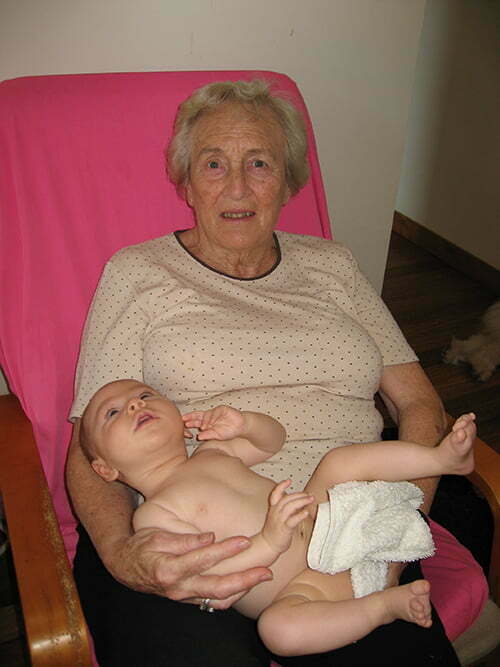My mum helped me deepen my understanding about babies when my second child was a small baby. This, despite the fact that I’d been studying babies and children for the previous 19 years!
I have found, after studying Aware Parenting, and through parenting, and giving consultations to parents, that babies need to heal from stress and over-stimulation through daily crying in loving arms once all their immediate needs are met. When they have that opportunity, they are relaxed and alert, and sleep easily.
When my daughter was born I could not bear the feelings stimulated in me when she cried, even though I had read The Aware Baby and agreed with it all. So I fed her almost constantly and when I wasn’t feeding her I was jiggling her to stop her crying – and she cried for about five minutes in total in her first three months. At three months I began to hold her in my arms and try to be present with her when she cried (and all her immediate needs were met). Many uncomfortable feelings emerged in me. As I saw the effects that her crying in arms had on her (relaxed body, lots of eye contact, peaceful sleep), I felt increasingly comfortable with her crying. When my son was born, I welcomed his cries once all his needs were met. He cried each day as I sat holding him, and I thought I felt comfortable. But I was telling myself, “he’s just releasing stress’.
Then my mum came to visit. Already familiar with Aware Parenting, she was willing to hold Sunny when he cried, without jiggling, distracting, or singing to him. I was grateful and touched; it helped with my healing (I was in an incubator for the first five weeks of my life and missed out being held during that oh-so-important time).
One evening, as Sunny was having a cry, having been recently fed, and having been carried all day, my mum made a sympathetic noise, “Aah, Sunny.” I was tired and it had been a long day, and I stormed off into the bedroom. I had translated her words and tone of voice to say that I should stop him crying, and I really wanted acceptance for the parenting I was doing. That day I had also decided to give up something that kept me disconnected from my own feelings – and this combined with the trigger of my mum’s words sent me into some deep feelings of hurt. The next morning I was still in my tower of isolation, after a headache lasting most of the night. I really allowed my sadness in, and cried, and as Sunny was crying with me I looked into his eyes and connected with him – he wasn’t just having a cry; he was feeling, intensely. Just as when I cry, I really feel the feelings, so was he. When I allowed myself to connect to him in his pain, from my pain, the love in my heart opened me up more and I felt such tenderness. The bond between us deepened closer to my core. Thanks mum, for your empathic response that helped me to see how much Sunny really feels. Now when he cries, I try to guess what he might be experiencing; perhaps the confusion and overwhelm of coming out of the cosy womb into the world. The light, the sounds of the telephone and the washing machine, new sensations on his skin, weight and pressure and temperature, different types of movement, all so new and unfamiliar.
I had moved from protecting myself from my pain by feeding my tiny daughter instead of hearing her feelings, to protecting myself from my feelings by telling myself that my son was simply healing from stress. In both cases, I was not being present and compassionate with my own pain, and thus could not bear to hear theirs. My ability to be emotionally present with my children depends on what I am feeling, how much I am connected with those feelings, and how much healing I have done (through crying, receiving empathy, aligning a la Field, etc.)
I remember during my training as a psychotherapist learning about the process of projective identification – this is where a baby has unmanageable feelings, such as distress, fear, or helplessness, and cries with the unconscious aim for the parent to feel these feelings. If the parent can bear to feel these feelings, the baby can then, “take back those feelings, now made more manageable; and along with this can take in something of the [parent’s] capacity to tolerate being in touch with difficult feelings.” (Casement, 1985, p.82). Casement goes on to say “if the [parent] remains shut off from this attempt at communication …. The [baby] experiences the projection as thrown back; and the unmanageable feelings being projected remain unmanageable. Likewise, if the [parent] experiences (but cannot bear).. the feelings being projected, the [baby] will experience the [parent] as thrown off balance by what is being projected; and the sense of these feelings being unmanageable is traumatically confirmed.” (1985:82) In layman’s terms, the more comfortable we are with our own feelings, the more we can be present with those of our children, and thus the more they can be comfortably in touch with their feelings.
I am learning daily as a parent that my children help me by bringing me up against my hurt places, so that I can heal. The more I can grow emotionally, the more I can help them with their emotional lives. I hope I can keep responding to their invitations. Thank you Lana and Sunny.
Casement, Patrick. (1985) On Learning from the Patient. Routledge, London and New York.
Solter, Aletha. (2001) The Aware Baby. (revised edition). Shining Star Press.
